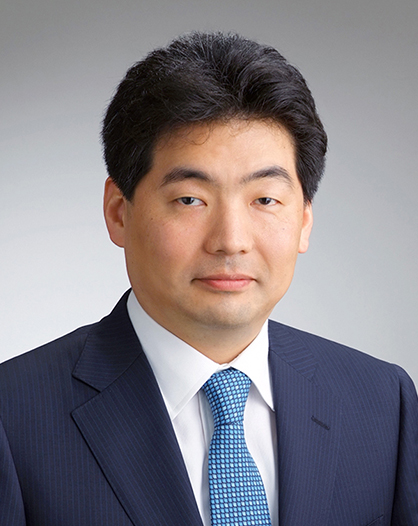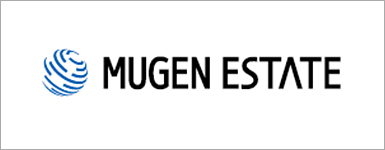| MUGEN ESTATE Co., Ltd. (3299) |
|
||||||||
Company |
MUGEN ESTATE Co., Ltd. |
||
Code No. |
3299 |
||
Exchange |
TSE 1st Section |
||
Industry |
Real Estate |
||
President |
Shinichi Fujita |
||
HQ Address |
Nihonbashi Hama-cho 3-19-3, Chuo-ku, Tokyo |
||
Year-end |
December |
||
Homepage |
|||
*Stock price as of close on August 31, 2016. Shares outstanding is taken from the most recent earnings announcement documents.
ROE is on actual data taken from the most recently ended fiscal year. *A 2 for 1 stock split became effective on June 30, 2016. BPS has been adjusted for the effect of the stock split. |
||||||||||||||||||||||||
|
|
* Estimates are those of the Company. Earnings until fiscal year December 2011 are non-consolidated, and those thereafter are consolidated.
*A 500 for 1 stock split was performed on March 26, 2014. A 2 for 1 stock split became effective on June 30, 2016. EPS and dividends have been adjusted to reflect this stock split. From fiscal year December 2016, the definition for net Profit has been changed to net profit attributable to parent company shareholders (Abbreviated as Parent Company Net Profit). |
| Key Points |
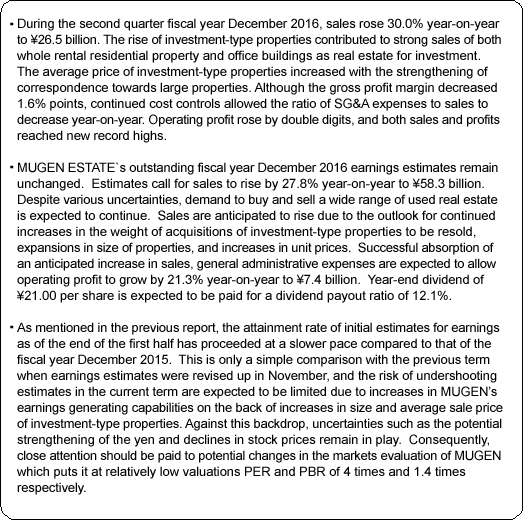 |
| Company Overview |
|
<Corporate Profile>
Susumu Fujita, currently the Chairman of MUGEN ESTATE, founded the Company in 1990 for the acquisition of used condominiums to be refurbished for resale to first time purchasers. This marked the start of the used condominium refurbishment business. Amidst the expansion of the used condominium market, MUGEN ESTATE has been able to carry on without outside capital by cultivating staff on its own to achieve steady growth. The subsidiary FUJI HOME Co., Ltd. was established in 1997 to provide refurbishment services. The Company has been able to overcome various difficulties including the Lehman Shock and the Great East Japan Earthquake, and listed its shares on the Mothers Market of the Tokyo Stock Exchange in June 2014, and on the first section of the Tokyo Stock Exchange in February 2016.
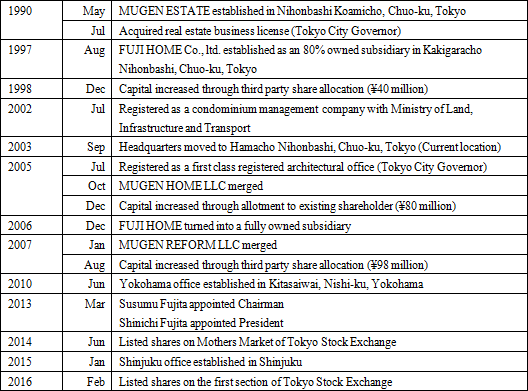 <Corporate Philosophy>
The corporate philosophy is reflected in its name "MUGEN" ("Dream comes true"; Japanese word) and calls for "the pursuit of ideals, realization of dreams." MUGEN ESTATE's goal is to help customers realize their own dreams by owning a house of their own, while also striving to realize dream through ongoing growth of the Company and of its employees.
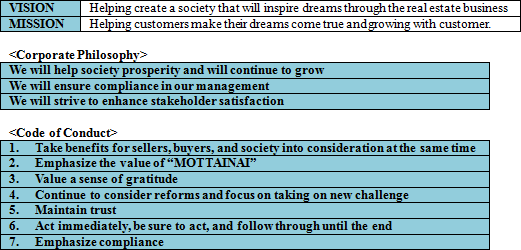 <Market Environment>
Expanding Market for Refurbished and Used Residential Properties
The Ministry of Land, Infrastructure and Transport announced the "Total Plan for Renovating Existing Homes" in March 2012 with a view to double the size of the refurbished and used residential property market. Based upon the goal of achieving a shift in the focus from the newly constructed residential property market to the used residential property market where used residential properties are refurbished to improve their quality and functions, the used residential property refurbishment market is expected to double its current size to ¥20 trillion by 2020.As part of such measures, "efforts will be made to quickly structure the market from the consumers' point of view so that consumers can safely purchase used residential properties and carry out refurbishment. At the same time, MLIT will also promote comprehensive efforts to cultivate companies and people who shall be responsible for providing attractive refurbished and used residential properties that respond to the diverse needs of consumers, and with the goal of promoting improvements in quality and increasing liquidity of used residential properties." Attractive Real Estate Market in Tokyo Metropolitan Region
The used condominium market in the Tokyo and surrounding metropolitan region grew by 81% over the 10-year period from 2003 to 2013 for an annual growth rate of approximately 6%. This growth owed to overall lessened hesitation among consumers for purchasing a used condominium resulting from the sense of security gained through the fact that consumers could see the actual used condominium prior to purchase, through which they could picture better how their life would be at home. Expansion of loans offered by financial institutions, and the comparatively low pricing of refurbished used condominiums relative to new condominiums were other factors contributing to the growth. While a rebound from the rush to purchase ahead of the consumption tax hike in 2014 contributed to a drop in demand, demand in 2015 recovered to the levels seen in 2013.Continued Favorable Conditions for the Used Condominium Market: At the same time, the market of whole rental residential properties and office buildings as real estate for investment is expected to remain highly active given the growing interest in real estate investment by affluent people and individual investors within Japan, and from overseas in view of the Tokyo Olympics and Paralympics to be held in 2020. 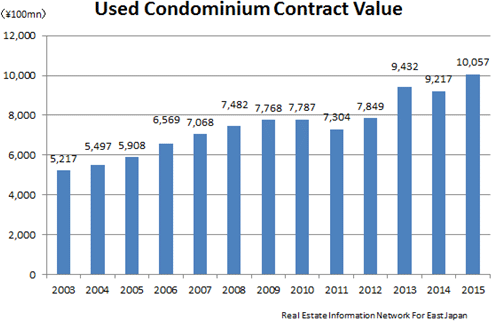 Huge Latent Market:
According to the "2008 House and Land Statistics Survey" published by the Ministry of Internal Affairs and Communications, the number of "non-wooden residential properties" in the Tokyo and greater metropolitan region (Tokyo, Kanagawa, Saitama and Chiba) stood at 7.00 million units. MUGEN ESTATE maintains a basic policy of purchasing only condominiums that pass the new earthquake standards implemented in 1981, which account for 63% of overall, or 4.40 million units of the total number of non-wooden structure multiple unit residence buildings constructed between 1981 and 2005. Given that the Company purchased 602units of properties for investments and for residence during fiscal year December 2015, the latent market potential for MUGEN ESTATE remains huge.
Household Numbers in The Tokyo Metropolitan Region On The Rise:
While a contraction in the total population of Japan arising from declining birth rates appears to be unavoidable at present, the National Institute of Population and Social Security Research estimates that the number of households in the Tokyo metropolitan region will continue to grow until peaking in 2025.
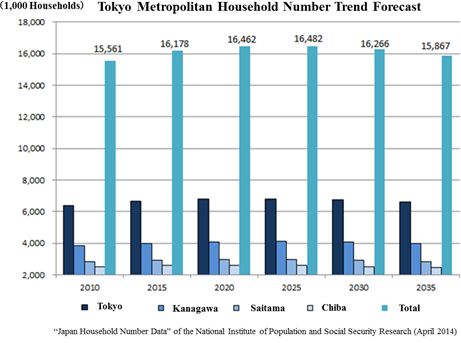 Growing Interest of Overseas Investors:
Sales ratio for foreign investors in total sales rose significantly from 11.7% in FY2013 to 20.6% in FY2015, but has declined to 10% level. Enthusiasm seen in Taiwan's investors mainly ended for the moment.However, demands of Chinese investors including the corporates established in Japan by them are expected to continue steadily. 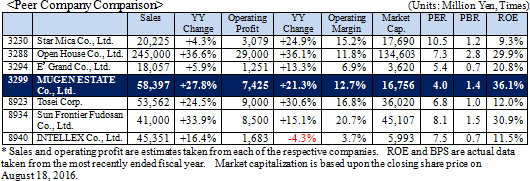 <Business Description>
MUGEN ESTATE's business is divided between the two segments of "real estate trading" and "real estate leasing and other" businesses, with the real estate trading segment business accounting for about 96% of total sales during fiscal year December 2015. The Company plans to promote efforts to expand its earnings deriving from the real estate leasing and other business segment.
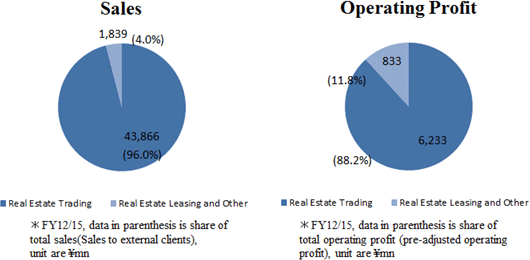 <Real Estate Trading Business>
The real estate trading business segment includes the three services of real estate resale, interior and exterior refurbishment and construction, and real estate distribution with the main service being the resale of real estate.
Sales and Operating Profit of ¥43.866 and ¥6.233 Billion in FY12/15 ◎ Purchases and Resale Business
The Company purchases used condominiums for sectional ownership, real estate for investment, and detached housing properties in the Tokyo Metropolitan Areas, including Tokyo, Kanagawa, Saitama and Chiba. To increase their value, the Company then has the subsidiary FUJI HOME, and some others, refurbish them in accordance with their age, space, layout, location and management condition.Main Value Addition Activities  The residential-type properties are those which purchased by consumers for the purpose of living in them, which include detached housing in addition to its main item of condominiums for sectional ownership. These properties are bought primarily by first time purchasers and their prices are mostly in the ¥20 to ¥30 million range. MUGEN ESTATE sold over the course of fiscal year December 2015, 227 units of real estate for investment and 375 units for residence. MUGEN ESTATE boasts of a unique business process where one sales person is responsible for the acquisition, refurbishment and sale of real estate. Furthermore, the Company's sales staff visit real estate brokers such as Mitsui No Rehouse, Nomura Real Estate Urban Net Co., Ltd., Sumitomo Real Estate Sales Co., Ltd., Tokyu Livable Co., Ltd. and others in the Tokyo metropolitan region to obtain information about real estate for sale by both individuals and corporations. By visiting these real estate companies, sales staff are able to obtain real estate information on superior properties that have yet to be released through public channels. After obtaining information on real estate for sale, analysis is conducted regarding the properties' potential for increased value and resale at higher prices after renovation and refurbishment. If MUGEN ESTATE finds that there is that potential, then they acquire the properties and then outsource the task of refurbishment to a subcontracting company under the supervision of its subsidiary, FUJI HOME. An analysis of the potential customer base specific to the location of the property is conducted by sales staff to determine the price and other needs of the customers, and in some instances a three bedroom used condominium maybe converted into a two bedroom condominium and other refurbishments are undertaken to raise the attractiveness of the property (Refurbishments are conducted with a view to the end sale price and ensuring profitability on the sale). Sales staff responsible for purchasing the real estate adhere to standards established by the Company. These internal standards are comprised of various factors including specific balance between acquisition price and management fees, proximity to train stations and no properties requiring bus rides, and other specific information known internally as the "12 purchase conditions," which have been developed over the history of the Company's operations and are effective as a context for the conduct of its business. At the same time, this standard developed on MUGEN ESTATE's own unique knowhow also serves to support less experienced sales staff in making the correct analysis and purchase of real estate. In addition, sales staff consult with their managers and superiors to obtain appropriate advice on how to carry on their business process. And while high commission involved in sales activities for condominiums tends to lead sales staff to act discretionally in general in the industry, MUGEN ESTATE maintains a culture of team work, where sales staff consult each other for advice and superiors lead their subordinates in the right direction on the business process. Furthermore, MUGEN ESTATE pays its sales staff commissions, not based upon the resale value but upon the profit derived from the resale as a means of reducing the risk of excessive purchases and leftover inventories that many of its competitors suffer. In recent years, the interest of overseas investors, especially those in Taiwan, in acquiring Japanese real estate has increased, and the number of real estate brokers specialized in dealing with overseas investors is growing. Against this backdrop, sales to overseas investors is on the rise. The share of real estate for investment sales derived from overseas investors rose from 11.7% in fiscal year December 2013 to 20.6% in fiscal year December 2015. ◎ Interior and Exterior Refurbishment Business
The subsidiary FUJI HOME conducts refurbishment of both the interiors and exteriors of purchased used real estate. FUJI HOME boasts of bountiful knowhow in refurbishment services based upon over 500 refurbishment projects conducted through accurate surveys and analysis of real estate properties by its highly skilled staff, including first class registered architects. Orders from MUGEN ESTATE currently account for over 90% of FUJI HOME's total orders, but it is endeavoring to expand orders from external clients.
◎ Brokerage Business
Information about real estate purchased for resale by MUGEN ESTATE is handled by FUJI HOME. In addition to the company website, they also puts it up on other portal sites for used real estate information operated by other companies. Furthermore, they also provide mediation services for MUGEN ESTATE in their acquisition of real estate properties. Also, synergies with the Company's real estate resale business can be realized by gathering accurate information about the needs of used real estate purchasers.
<Real Estate Leasing and Other Business>
Optimization of the sales function of the real estate resale business is being pursued.
Sales and Operating Profit of ¥1.839 and ¥0.833 Billion Recorded in Fiscal Year December 2015 ◎ Leasing Business
Real estate purchased as investment-type properties and as fixed asset properties are leased to end users. In principle, real estate is purchased with the objective of sales. However, renting and leasing is used as a means of deriving income until the properties are sold.
◎ Property Management Business
Management services for leased real estate that have been acquired as investment-type properties and fixed asset properties are conducted. Improvement in the management of structures, restoration of wear and tear caused by age, leasing of vacant rooms, collection of outstanding rent, and other measures are implemented as part of a strategy of increasing the value of properties and improving the return on investment-type properties. In some cases, property management services are maintained even after investment-type properties is sold at the request of purchasers.
<Management Strategy>
The "Three S's" designed to collateralize sustained growth and establish a sound earnings foundation.
<Characteristics and Strengths>
In addition to the above mentioned real estate resale service, MUGEN ESTATE also performs real estate rental, real estate refurbishment, real estate distribution, and real estate management services. The knowhow developed in its various businesses based on the results of the many years of operation is leverage to be able to respond flexibly to changes in the market and derive various synergies between its various businesses.
① Management Leveraging Synergies ② Diverse Product Lineup and Unique Positioning
With regards to the core real estate resale business, MUGEN ESTATE boasts of a strong information gathering capability based upon its network in the used real estate market in the Tokyo and the surrounding metropolitan region, which has enabled the Company to develop a diverse lineup including condominiums for sectional ownership, real estate for investment (whole rental condominium complexes, offices and apartment buildings) and detached housing, and to respond quickly and accurately to customers' needs. In addition, MUGEN ESTATE has developed a strong reputation amongst real estate brokers for its ability to respond to all of the information gathered from them. Returning to those real estate brokers upon completion of rendering resale properties creates a benevolent cycle where the Company gains preferential treatment in the gathering of information on superior real estate.
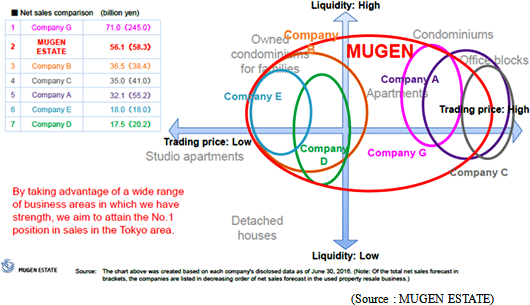 ③Strength of High Levels of Professional Skills
The information gathering, investment decision making, property management, technological response and other capabilities are all part of MUGEN ESTATE's high levels of professional skills and allow the Company to provide superior properties to the market.
|
| First Half of Fiscal Year December 2016 Earnings Overview |
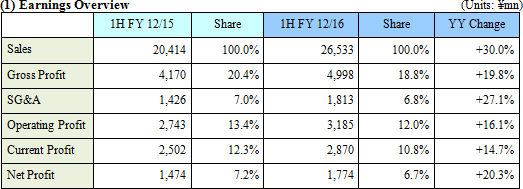 Continued Favorable Trends in Sales of Real Estate for Investment Allow Sales, Profits to Rise to Record Highs
Sales rose by 30.0% year-on-year to ¥26.5 billion. The rise of sales in real estate for investment contributed to strong sales of both whole rental residential property and office buildings as investment real estate. The average sales price of investment real estate increased due to deliberate efforts to strengthen pricing of large properties. Although the gross profit margin decreased 1.6% points year-on-year, continuing of cost controls allowed the sales, general and administrative expense ratio decline year-on-year. Operating profit rose by double-digit growth, and both sales and profits reached new record highs.
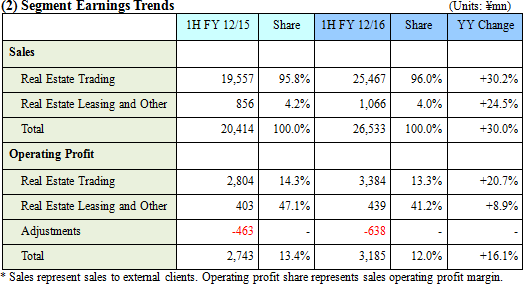 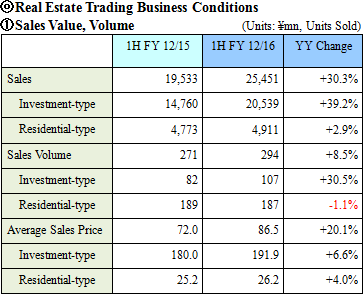 The barriers to entry in the real estate for residence segment of the market are low and purchase prices are rising due to increased competition. The Company decided to expand its portfolio by fortifying its lineup of detached houses for affluent Japanese. By geographic region, Tokyo accounts for over half of the market and MUGEN ESTATE has started formatting an area-distributed portfolio of the metropolitan area of Tokyo and three neighboring prefectures. Average sales prices of investment-type properties vary greatly depending on region, being affected by large-scale properties. Although the number of sales increased, the share of sales to overseas investors purchasing investment-type properties in Japan in volume terms declined from 21.2% in the previous fiscal year to 11.2% in the current fiscal year, and in value terms declined by 26.6% year-on-year. And while demand from Taiwanese investors investing in Japanese real estate has abated, demand from Chinese investors and domestic corporations remains high.  The data shown in the above table is the average number of days from the acquisition to sales of used real estate known as the "business cycle." The average business cycle of real estate for investment is lengthening due to the increase in the size of properties sold. The target for the current fiscal year is 200 days for investment type, and 150 days for residential type. 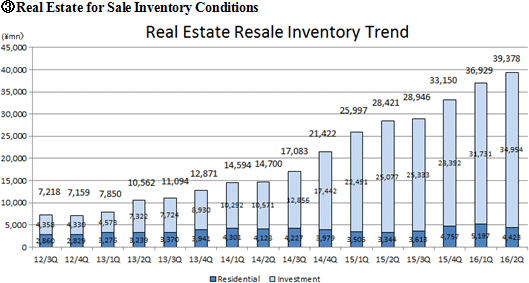 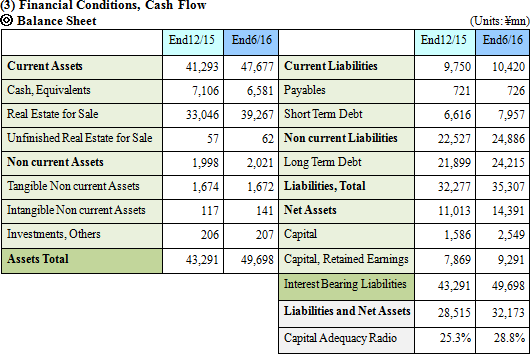  |
| Fiscal Year December 2016 Earnings Estimate |
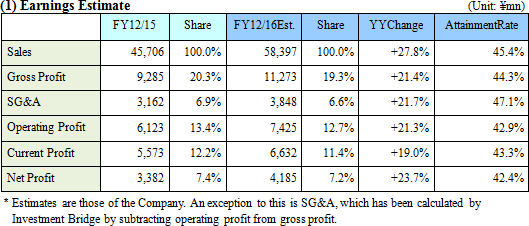 Outstanding Earnings Estimate Maintained, Fifth Consecutive Year of Increases in Sales, Profits Expected, Both Expected to Rise to Record Highs
MUGEN ESTATE maintained its outstanding earnings estimates, which call for sales to rise by 27.8% year-on-year to ¥58.3 billion. Although various uncertainties cast shadows over the operating environment, demand for a wide range of used real estate for sale and purchase is expected to continue. Sales are expected to rise on the back of continued efforts to increase the proportion of purchase and resale of investment-type properties, expansions in size of properties, contributions from rental business, and the increase of unit prices. Successful absorption of an anticipated increase in sales, general and administrative expenses are expected to allow operating profit to grow by 21.3% year-on-year to ¥7.4 billion. Dividend payment is expected to be ¥21.00 per share for an anticipated dividend payout ratio of 12.1%.
 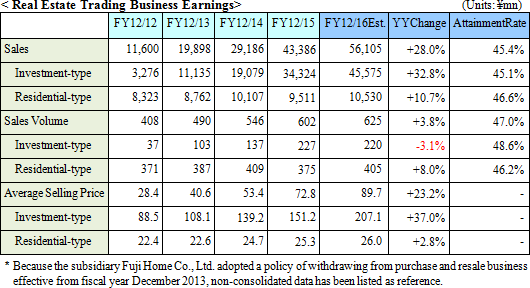 |
| Conclusions |
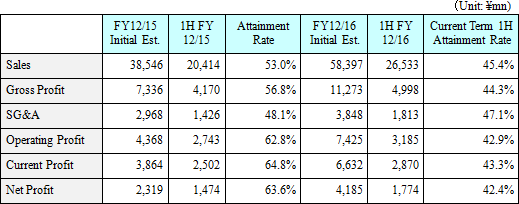 |
| <Reference: Regarding corporate governance> |
 ◎ Corporate Governance Report
The company submitted a latest corporate governance report on Mar. 28, 2016.
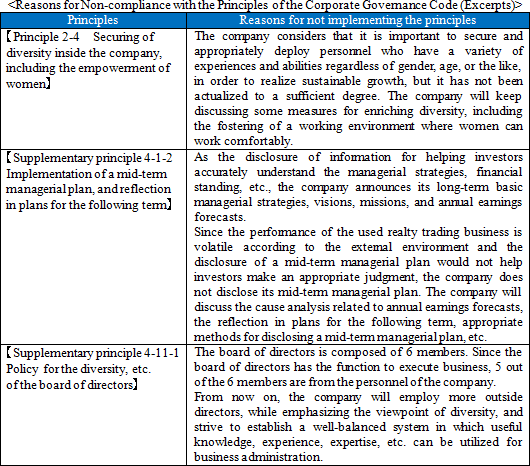 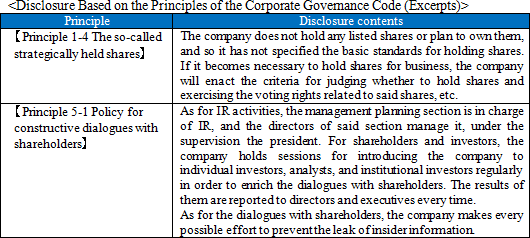 Disclaimer
This report is intended solely for information purposes, and is not intended as a solicitation to invest in the shares of this company. The information and opinions contained within this report are based on data made publicly available by the Company, and comes from sources that we judge to be reliable. However, we cannot guarantee the accuracy or completeness of the data. This report is not a guarantee of the accuracy, completeness or validity of said information and or opinions, nor do we bear any responsibility for the same. All rights pertaining to this report belong to Investment Bridge Co., Ltd., which may change the contents thereof at any time without prior notice. All investment decisions are the responsibility of the individual and should be made only after proper consideration.Copyright(C) 2016, Investment Bridge Co., Ltd. All Rights Reserved. |

